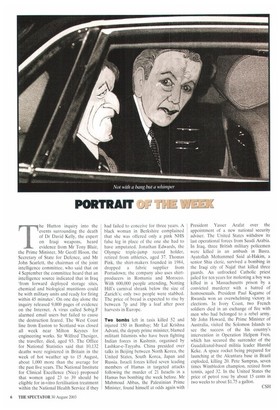T he Hutton inquiry into the events surrounding the death of
Dr David Kelly, the expert on Iraqi weapons, heard evidence from Mr Tony Blair, the Prime Minister, Mr Geoff Hoon, the Secretary of State for Defence, and Mr John Scarlett, the chairman of the joint intelligence committee, who said that on 4 September the committee heard that an intelligence source indicated that in Iraq 'from forward deployed storage sites, chemical and biological munitions could be with military units and ready for firing within 45 minutes'. On one day alone the inquiry released 9,000 pages of evidence on the Internet. A virus called Sobig.F alarmed email users but failed to cause the destruction feared. The West Coast line from Euston to Scotland was closed all week near Milton Keynes for engineering works. Sir Wilfred Thesiger, the traveller, died, aged 93. The Office for National Statistics said that 10.132 deaths were registered in Britain in the week of hot weather up to 15 August, about 1,000 more than the average for the past five years. The National Institute for Clinical Excellence (Nice) proposed that women aged 23 to 39 should be eligible for in-vitro fertilisation treatment within the National Health Service if they
had failed to conceive for three years. A black woman in Berkshire complained that she was offered only a pink NHS false leg in place of the one she had to have amputated. Jonathan Edwards, the Olympic triple-jump record holder, retired from athletics, aged 37. Thomas Pink, the shirt-makers founded in 1984, dropped a fabric supplier from Portadown; the company also uses shirtproducers in Romania and Morocco. With 600,000 people attending, Notting Hill's carnival shrank below the size of Zurich's; only two people were stabbed. The price of bread is expected to rise by between 7p and 10p a loaf after poor harvests in Europe.
Two bombs left in taxis killed 52 and injured 150 in Bombay; Mr Lal Krishna Advani, the deputy prime minister, blamed militant Islamists who have been fighting Indian forces in Kashmir, organised by Lashkar-e-Tayyaba. China presided over talks in Beijing between North Korea, the United States, South Korea, Japan and Russia. Israeli forces killed seven leading members of Hamas in targeted attacks following the murder of 21 Israelis in a Hamas bus bombing the week before. Mr Mahmoud Abbas, the Palestinian Prime Minister, found himself at odds again with President Yasser Arafat over the appointment of a new national security adviser. The United States withdrew its last operational forces from Saudi Arabia. In Iraq, three British military policemen were killed in an ambush in Basra. Ayatollah Mohammed Said al-Hakim, a senior Shia cleric, survived a bombing in the Iraqi city of Najaf that killed three guards. An unfrocked Catholic priest jailed for ten years for molesting a boy was killed in a Massachusetts prison by a convicted murderer with a hatred of homosexuals. President Paul Kagame of Rwanda won an overwhelming victory in elections. In Ivory Coast, two French soldiers died in an exchange of fire with men who had belonged to a rebel army. Mr John Howard, the Prime Minister of Australia, visited the Solomon Islands to see the success of the his country's intervention in Operation Helpem Fren, which has secured the surrender of the Guadalcanal-based militia leader Harold Keke. A space rocket being prepared for launching at the Alcantara base in Brazil exploded, killing 20. Pete Sampras, seven times Wimbledon champion, retired from tennis, aged 32. In the United States the price of petrol rose by about 15 cents in two weeks to about $1.75 a gallon.
CSH


























































 Previous page
Previous page